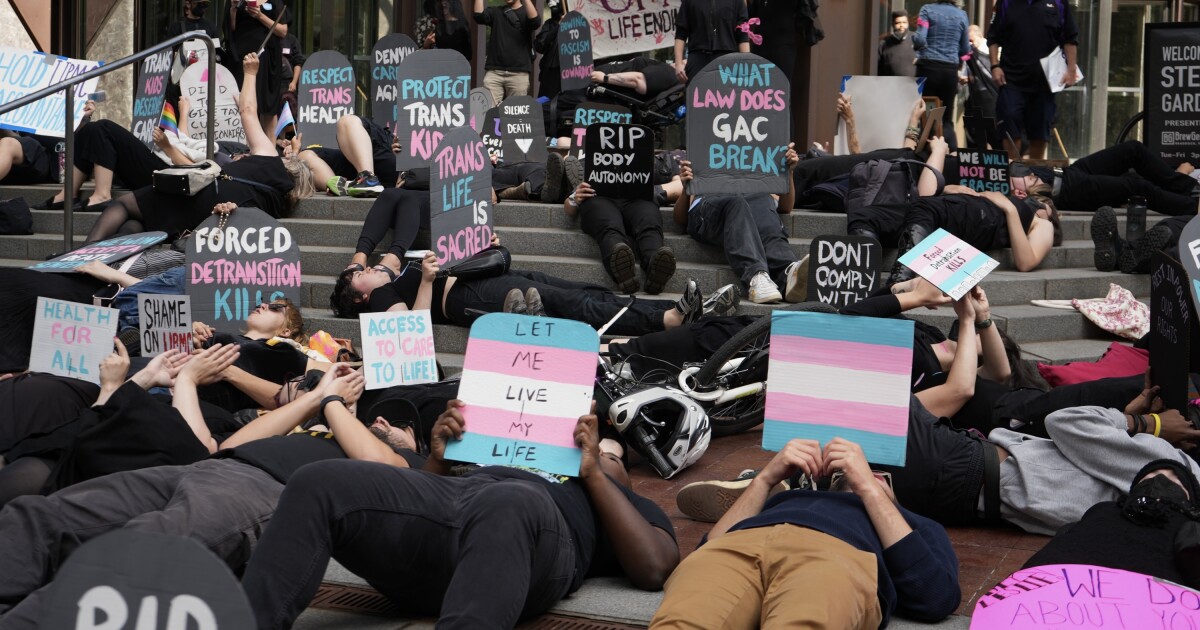In recent weeks, a rallying call has echoed through Pittsburgh as protesters united against the drastic cuts to gender-affirming care for transgender youth at the University of Pittsburgh Medical Center (UPMC). The situation reflects a larger national conversation surrounding healthcare access, especially for marginalized communities.
The demonstration coincided with a “die-in” staged by healthcare providers and community activists, highlighting the grave implications that the cessation of services like hormone replacement therapy and puberty blockers would impose on young trans individuals. The emotional impact of these cuts resonates deeply, given that they threaten the health and well-being of a vulnerable population.
UPMC’s decision to restrict access to gender-affirming care came amidst a broader initiative that activists argue has unfairly targeted trans youth. The organization announced these cuts during the summer, leading to increased anxiety and frustration among healthcare providers who had long supported gender-affirming treatments. Olivia Mincone, a registered nurse at UPMC’s Services for Teens at Risk (STAR) Center, expressed her disappointment at UPMC’s decision to comply with federal pressures under the Trump administration, which many view as a regression in healthcare rights for trans youth.
Critically, the overarching fear of these service cuts is compounded by the Department of Justice’s recent subpoena for health records pertaining to young trans patients at UPMC and several other facilities across the nation. This federal inquiry raises serious questions around patient confidentiality and the potential for discrimination against trans individuals, further contributing to the ongoing crisis of trust in healthcare systems. Mincone criticized UPMC for not providing clarity or communication around these issues, essentially leaving healthcare providers unsure about how to navigate the complexities posed by such limitations on care.
Katherine Anderson, a behavioral health therapist at the STAR Center, voiced her dismay over UPMC’s willingness to comply with federal subpoenas without resistance. This perceived capitulation sends a troubling message to both patients and their advocates, suggesting a lack of commitment to safeguard sensitive health information for an already marginalized community.
The demonstrators’ collective grief during the “die-in,” where they lay on the ground in silence for the time equivalent to 375 drumbeats—representing the number of young patients who lost access to critical services—profoundly illustrated the emotional toll of the cuts.
These protests and discussions extend beyond Pittsburgh, reflecting a growing awareness of the implications of policies that restrict healthcare access based on gender identity. Activists like Matthew Baumann articulated fears regarding the potential mental health crises that could arise from suddenly stripping young individuals of essential medical support. The concern is that many might turn to unsafe alternatives for hormone therapies, which lack the integrity and oversight provided by licensed medical professionals.
Moreover, the broader impact of these healthcare policy changes raises significant ethical questions. As Kaiah Scott, a trans advocacy group coordinator, poignantly pointed out, the cuts are not merely policy shifts; they symbolize a larger societal message about the worth of trans lives. Such decisions can foster a sense of alienation among young individuals who may already feel unsafe or undervalued.
In response to these challenges, community leaders and healthcare advocates are mobilizing efforts to pressure UPMC to reinstate gender-affirming care and ensure that the rights of trans youth are not sidelined by political maneuvering. This movement envisions a future where health systems prioritize the needs and rights of all individuals, particularly those from marginalized communities.
As Pennsylvania Gov. Josh Shapiro, alongside other Democratic leaders, combats the pressures from the federal government, a concerted effort is being made to advocate for the rights of those seeking gender-affirming care. This legal push exemplifies the ongoing battle against the politicization of healthcare, particularly when the consequences are so deeply felt by those who rely on these services for their well-being.
In conclusion, the situation surrounding UPMC’s cuts to gender-affirming care serves as a stark reminder of the fragility of healthcare rights for marginalized communities. As the Pittsburgh medical providers and activists continue to voice their concerns, they embody a powerful resistance to the growing trend of discrimination within healthcare. Their resolute commitment to advocating for trans youth shines a light on the critical need for systemic changes and the importance of empathy and support in medical settings. Every step taken toward reinstating vital services not only champions the rights of trans individuals but also fosters a healthcare environment grounded in dignity and respect for all.
This ongoing dialogue is crucial for ensuring that marginalized voices are heard and that healthcare decisions consider the identity and needs of every patient. The challenges presented by recent policy changes underscore a fundamental truth: healthcare is a right, and advocacy for equitable access must persist.
Source link









